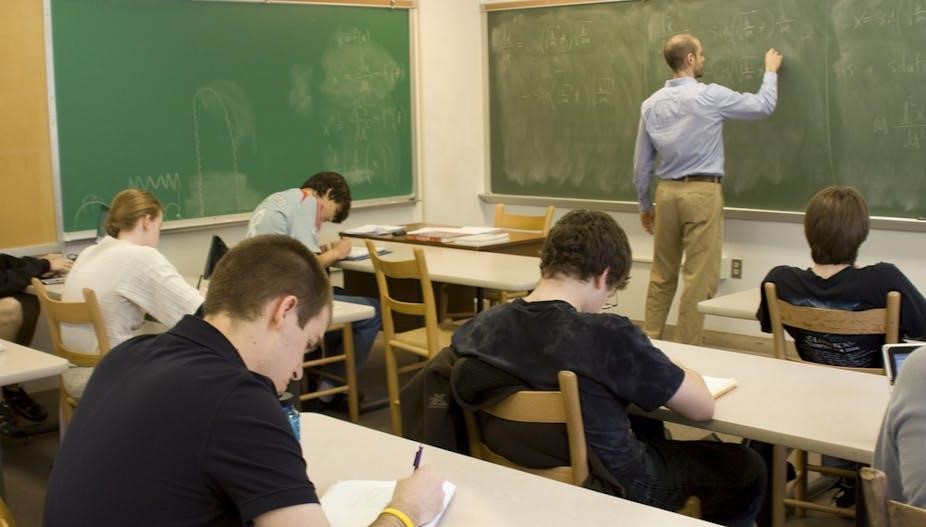There is a crisis in the education system, and it’s affecting the life chances of many young Australians. The number of secondary teaching graduates with adequate qualifications to teach mathematics is well below what it should be, and children’s education is suffering.
A report completed for the Australian Council of Deans of Science in 2006 documented the problem, but the situation has deteriorated since. The percentage of Year 12 students completing the more advanced mathematics courses continues to decline. This affects mathematics enrolments in the universities and a number no longer offer a major in mathematics, worsening an already inadequate supply of qualified teachers.
Changing qualifications
To exacerbate an already serious problem, the Australian Institute for Teaching and School Leadership (AITSL) currently proposes that graduate entry secondary programs must comprise at least two years of full-time equivalent professional studies in education.
There will be no DipEd pathway, which allows graduates to enter the profession within a year. Forcing them to spend more time in education will lead to increased debt. You couldn’t blame people for changing their mind about becoming a teacher.
I believe the changes in qualifications will lead to a disaster, denying even more young people access to a quality mathematics education that gives them real opportunities in the modern world.
An unequal opportunity
This is a social justice issue because access to a decent mathematics education in Australia is now largely determined by where you live and parental income.
In the past there have been concerns regarding the participation of girls in mathematics and the effect on their careers and life chances.
Australia now seems incapable of responding to a situation where only the privileged have access to well-qualified teachers of mathematics.
The Northern Territory is a prime example. The contraction of mathematics at Charles Darwin University means the NT is now totally dependent on the rest of Australia for its secondary mathematics teachers. And how can talented mathematics students in the NT be encouraged to pursue mathematical careers when it means moving away?
Elsewhere most of regional Australia is largely dependent on mathematics teachers who complete their mathematics in the capital or large regional cities.
Examine the policy
In what is supposed to be a research-driven policy environment, has anyone considered the consequences of the AITSL proposal? And whether this will actually give teachers the skills they need for the positions they subsequently occupy?
In my own case I came to Melbourne with a BSc (Hons) from the University of Adelaide. In the early 1970s I completed a DipEd at La Trobe. The only real cost was some childcare. If I remember correctly the government was so keen to get professional women into the workforce, they even helped with the cost of books. Would I have committed to a two-year course? I’m not sure but I had no HECS debt and ongoing employment was just about guaranteed.
My first school had a very high percentage of students from a non-English speaking background. Many of the Year 7s had very poor achievement in mathematics and I turned my attention to finding out what could be done to help them reach a more appropriate standard.
In the course of this I met Associate Professor John Munro who stressed the importance of language in the learning of mathematics. To be a better mathematics teacher, I completed another degree in teaching English as a second language.
Later I coordinated a DipEd program. Many of our better students were of a mature age and struggling with money, family, jobs and a host of other things. They managed for a year.
Requiring them to complete two would have seen many of them not enrol in the first place or drop out when it became too much.
Learn on the job
A two-year teaching qualification does not necessarily equip you for the teaching situation you find yourself in. If AITSL wants all teachers to have a second year, let that be achieved in work-related learning over, for example, 5-7 years.
Australia can’t afford to lose a single prospective teacher who is an articulate, well-qualified graduate in mathematics. If the one-year DipEd goes, many will be lost. They have too many options. The new graduates will think about other courses, the career change, mature-age graduates will decide it is all too hard.
For more such insights, log into our website https://international-maths-challenge.com
Credit of the article given to Jan Thomas, Senior Fellow, Australian Mathematical Sciences Institute


